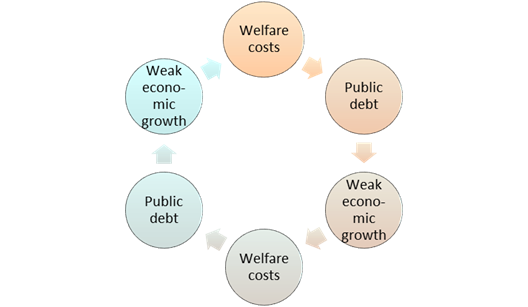Authored by Anthony Mueller via The Mises Institute,
People like the welfare state because they suppose that it comes at no costs and provides many benefits. If people knew how much the present consumption of social benefits entails less prosperity in the future, the population would have a critical attitude towards the welfare state and politicians would have a harder time selling their fraud. Just as a society that ranks security over liberty loses both, a society that attributes a higher value to social benefits than to wealth creation ends up with neither wealth nor benefits.
A short-term perspective is intrinsic to modern democracy. It is run not by the people but by political parties. Such a political system promotes the redistribution of the cake and neglects that the goods must be produced before they can be consumed. Without production, however, there can be no distribution. The illusion is widespread and propagated by the political machinery that production is independent of its distribution so that one could redistribute without weakening production. Yet how the product is distributed affects its future making.
A concept of justice that is only concerned with the social justice of distribution is a contradiction in terms. The justice of distribution of the goods has as its other side the justice regarding the efforts of producing the goods. Justice, rightly understood, has a distributive and a commutative aspect. The disregard of the commutative aspect of justice in favor of the distributive justice is unjust. Such an approach is also irrational since distribution is possible only when there is something to distribute.
Redistribution is unjust and economically irrational when it punishes those who produce. When the redistribution of income and wealth becomes excessive, the active part of the population withdraws from production and parasitism takes over, economic progress will falter und finally disappear. This way, society will impoverish, and the poor are left with less to nothing. In the end, the poor themselves will pay the steepest price of this policy because they will be the hardest hit when growth falls and the misery rise.
It is unethical to strive towards more justice as if it were an absolute good. The cost of imposing equality exceeds its benefits. At first, the negative effects of income equalization on economic growth are not visible. For some time, capital consumption may compensate for weak economic growth. This erosion does not immediately show up in the national income statistics because consumption counts as a part of the national product.
An insidious form of capital consumption takes place through government debt accumulation. A budget deficit means that the overall volume of national savings falls. Fewer savings imply that economic investment potential has become smaller. In the economic statistics, the expenditures — whether they are from the state or from the private side — count equally as a contribution to the national product. Yet while the spending benefits the current receivers of the government expenditures, the lower capital formation will later show up in weaker economic growth and punishes all.
In as much as public debt is an enemy of economic growth, it is also an enemy of wealth creation. The benefits which the government distributes in the short run and that are financed by higher public debt will reduce economic growth and make poverty persistent and more widespread in the long run.
Government debt weakens economic growth and weak economic growth leads to higher government expenditures and thus furthermore to a rising debt burden. Less economic growth ignites more demand for social benefits and more redistribution leads again to even less growth. Numerous countries have fallen into the trap where social expenditures weaken the economy and where this weakness requires more spending, which in turn weakens the economy.
Cycle of Welfare Spending and Economic Stagnation
Source: A. P. Mueller: Beyond the State and Politics. Capitalism for the New Millennium. Amazon KDP 2018
The expansion of the welfare state leads to a rising public debt, which weakens the economic performance. A weakening economy entails more welfare spending and leads to a further rise of public debt, which, in turn, leads to more welfare spending. A dangerous side effect of this fall into a downward spiral is that the anti-capitalistic attitude in the population increases, since for most citizens, the causal links are difficult to recognize.
This vicious cycle is noticeable in the decline in the rate of productivity growth of the industrialized countries since the 1970s that came along with the expansion of the welfare state and the rise of public debt. The welfare state and government debt are the main causes of the decline in productivity rates. Over the past decades, the rates of the annual increase of productivity of the major industrialized countries have fallen from an average of five percent in the 1960s to around two percent in the 1990s and keep on falling.
The escape from the welfare trap is the challenge of our time. Less productivity growth means less economic growth and less economic growth means lower income. The longer a country remains stuck in the trap, the harder it is to get out. To overcome the vicious cycle, the insight must take hold that an excessive welfare state erodes productivity.
Without productivity gains, there is no increase in real per capita income. The labor productivity of a country determines its income level. The industrialized nations must get out of the whirlpool of welfare spending, public debt, and weak economic growth. Lifting the purchasing power of salaries requires higher productivity. More state control is not the way to higher productivity but less regulation, less intervention, and less redistribution.
via ZeroHedge News https://ift.tt/2I40Rxn Tyler Durden

